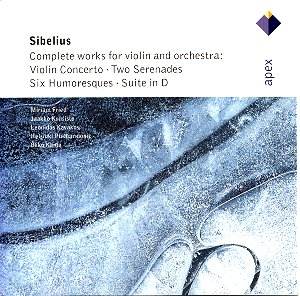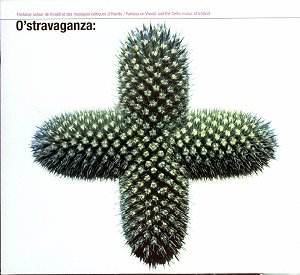 Composer: Jean Sibelius
Composer: Jean Sibelius
Works: Complete works for violin and orchestra; Violin Concerto; Serenades Nos. 1 & 2; Six Humoresques; Suite in D minor for violin & orchestra
Performers: Miriam Fried (violin), Jaakko Kuusisto (violin), Leonidas Kavakos (violin), Jari Valo (violin), Helsinki Philharmonic Orchestra/Okko Kamu, Kuopio Symphony Orchestra/Atso Almila, Tapiola Sinfonietta/Juliani Lamminmöki, Ostrobothnian Chamber Orchestra/Juha Kangas
Recording: 1988 (Violin Concerto), 1998 (others)
Label: Apex
Jean Sibelius, a towering figure of Finnish nationalism and a master of orchestral color, has left an indelible mark on the violin repertoire, most notably through his Violin Concerto. This collection of his complete works for violin and orchestra offers an intriguing exploration of his stylistic evolution and the emotional depth he imbued in even his lesser-known compositions. The performances, featuring a mix of seasoned soloists and orchestras, illuminate the multifaceted nature of Sibelius’s writing for the instrument, showcasing how his own background as a violinist deeply informed his compositional choices.
Miriam Fried’s interpretation of the Violin Concerto, recorded with the Helsinki Philharmonic Orchestra under Okko Kamu, stands out as a testament to her vast experience and emotional insight. Her technical prowess is evident, yet it is her interpretative choices that truly define this performance. Fried’s ability to manipulate tempo, particularly in the first movement, draws the listener into a compelling emotional landscape. For instance, her decision to linger on certain expressive passages invites a deeper contemplation of the music’s melancholic undercurrents, although this may polarize listeners who favor a more vigorous approach. The slow movement is marked by eloquent phrasing, though her sound lacks the crystalline purity characteristic of interpretations by violinists like Kyung-Wha Chung or Cho Liang Lin. The finale, while rich in sonority, may come across as somewhat sedate, potentially diverging from the exhilarating momentum that the piece can generate. Nonetheless, Fried’s nuanced performance, while not the most exhilarating, offers a rewarding insight into Sibelius’s emotional palette.
Leonidas Kavakos’s engagement with the Six Humoresques serves as a delightful complement to the Violin Concerto. These pieces, often overshadowed by Sibelius’s more prominent works, reveal a lighter, more whimsical side of the composer. Kavakos displays an affectionate command of the material, navigating the contrasting moods with dexterity and charm. The Tapiola Sinfonietta provides a sensitive backdrop that allows Kavakos’s expressive playing to shine, ensuring that the interplay between soloist and orchestra feels both organic and compelling. The orchestral and solo balances are meticulously maintained, showcasing the subtleties of Sibelius’s orchestration.
The Suite in D minor and the two Serenades, while perhaps less inspired than the other works, are performed with a commendable understanding of the idiom. Jari Valo’s execution of the Suite, recorded with the Ostrobothnian Chamber Orchestra, reflects a competent approach, though it lacks the imaginative spark found in the more celebrated pieces. The performances of the Serenades, under the baton of Atso Almila, evoke a pleasant, if unremarkable, charm. These pieces, which play a more auxiliary role in Sibelius’s oeuvre, benefit from the solid orchestral support but do not fully resonate with the same depth as his larger works.
Recording quality across the collection is generally commendable, with a balanced mix allowing for both the soloists’ nuances and the orchestral textures to be clearly articulated. The engineering captures the warmth of the string sound and the dynamic contrasts inherent in Sibelius’s writing, though the presentation of the accompanying booklet could benefit from greater care.
This recording anthology serves as a rich tapestry of Sibelius’s contributions to the violin repertoire, with performances that, while varying in interpretative vigor, collectively highlight the composer’s unique voice. Miriam Fried’s nuanced reading of the Violin Concerto and the delightful interpretations of the Humoresques by Kavakos stand out, even as the more ancillary pieces provide a broader context for Sibelius’s artistic vision. The overall listening experience is both enlightening and engaging, making this collection a valuable addition to the discography of Sibelius.



